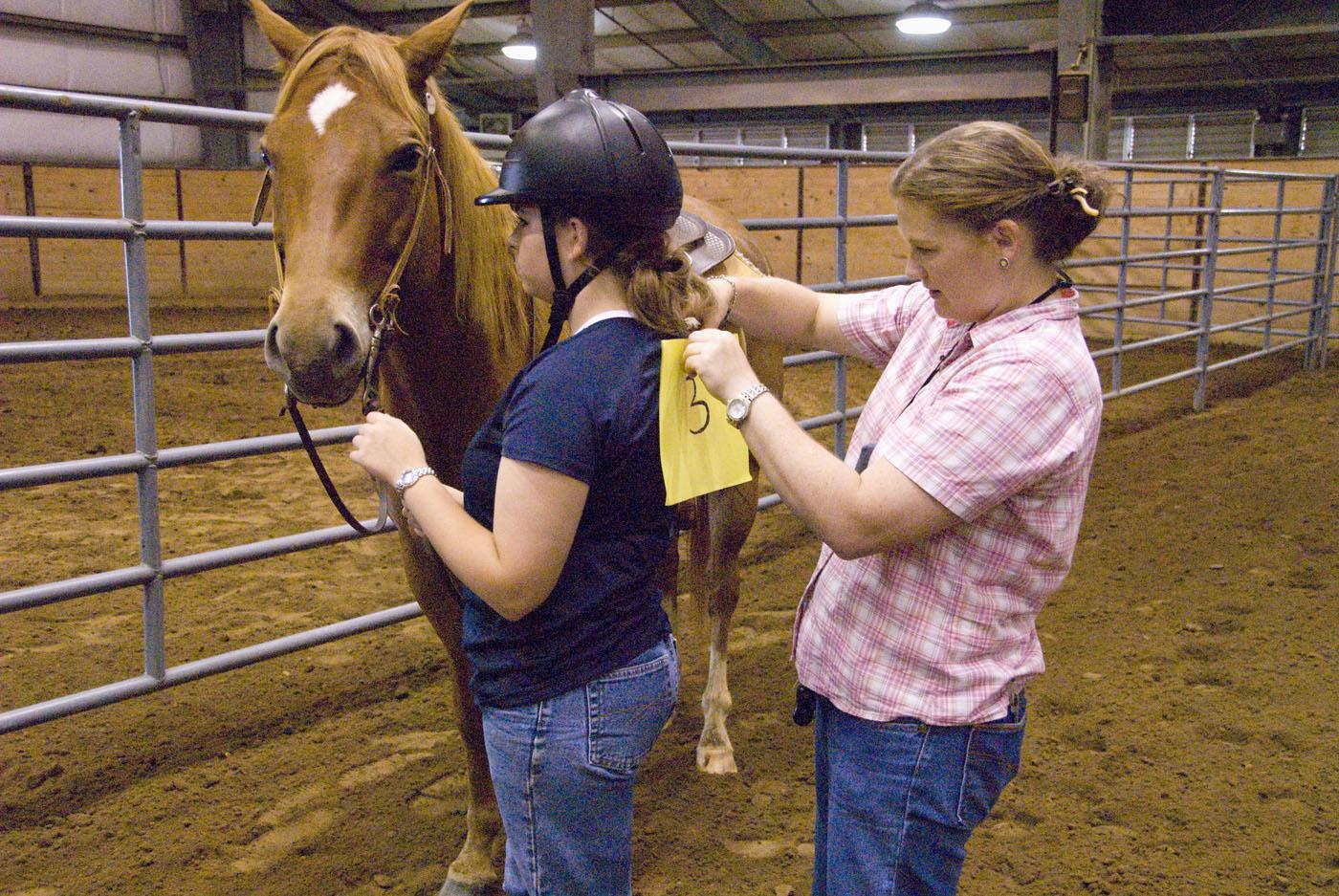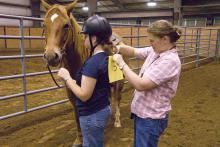Information Possibly Outdated
The information presented on this page was originally released on August 28, 2008. It may not be outdated, but please search our site for more current information. If you plan to quote or reference this information in a publication, please check with the Extension specialist or author before proceeding.
Different horse, unfamiliar tack no problem for MSU equestrians
By Patti Drapala
MSU Ag Communications
MISSISSIPPI STATE -- The challenge of drawing an unfamiliar mount and competing with someone else's saddle and bridle would throw many of the best riders in the world, but Mississippi State University's equestrian team does not find that aspect of intercollegiate club sports hard to handle.
To prepare for the realities of intercollegiate competition, team members train with different horses each time they ride. Molly Nicodemus, the team coach, said she believes this approach is one of the best ways to learn to read horses.
“Horses used for intercollegiate athletic competition are not polished show animals, and some riders can't handle that situation,” said Nicodemus, MSU associate professor of animal and dairy sciences. “Intercollegiate competition takes an individual who understands horses and won't get intimidated by quirks in their behavior.”
The horses also seem to understand human behavior.
“Horses pick up on your mood and emotions, and they are good listeners when you don't want to talk to other people,” said Laramy Cummings of Kilmichael, a member of the team who plans to work in the equine industry after she graduates with an animal science degree in 2009. “Riding can be a mental savior.”
MSU was the first institution of higher learning in the state to offer an intercollegiate equestrian team, which it established more than seven years ago. Since that time the team qualified several riders for regional and zone competitions, won high-point team and high-point rider awards and, as a non-varsity team, earned an opportunity to compete at a varsity equestrian invitational for the Southeastern Conference at the University of Georgia in 2003.
During the 2007-08 competitive season, team members competing in the hunt seat, or English riding, division won 11 first-place ribbons, 11 second-place ribbons and 10 third-place ribbons, and finished seventh overall at regionals. The team's stock seat, or western riding, division won eight first-place ribbons, six second-place ribbons and four third-place ribbons, and finished third at regionals.
“We have a successful equestrian team that was years in the making,” Nicodemus said. “The students on the team have a passion for horses, and we offer them opportunities to live that passion by supporting an equestrian team.”
Intercollegiate equestrian teams differ in several ways from those sanctioned by the National Collegiate Athletic Association as varsity teams. An intercollegiate team primarily receives its support from an academic department at the institution, which provides faculty advisers and coaches, accepts donations from benefactors and sponsors fund-raising activities. At times, team members have to defray expenses with their own money.
“There is a unique dynamic about this type of competition,” Nicodemus said. “Riders don't have to own or haul a horse and carry tack. They sometimes share clothes, hats and chaps, and they think of one another as a team rather than as rivals.”
Varsity teams are funded through a school's athletic department and have a budget that provides athletes with coaching, horses, facilities, training, equipment, travel and medical care.
Varsity teams must meet a competitive schedule traveling to states outside of the Southeastern Conference. Varsity athletes must abide by NCAA rules and compete within those guidelines.
The state of Mississippi does not have a varsity equestrian program at this time. MSU and Mississippi College are the only higher learning institutions that have intercollegiate teams, and both institutions compete in Zone 5, Region 1 of the Intercollegiate Horse Show Association. IHSA competitions are not recognized by the NCAA.
“Mississippi State has discussed the inclusion of a varsity equestrian program in the future, and we are working on a plan with Auburn University to schedule a scrimmage between their varsity team and open riders from our hunt seat and stock seat teams,” Nicodemus said.
Intercollegiate team members can choose to opt out of a competition. Unlike varsity competition, riders of any skill level on an intercollegiate team can compete, she said. Some intercollegiate teams may have riders who have never been to a horse show, while other riders will have shown at the national level.
Team members who are experienced riders often work with beginners to make them more comfortable.
“If one of us wins, we get together and discuss what the judge had to say,” said team member Chris Lanier of Starkville, who wants to pursue a graduate degree in equine reproduction. “Was the back straight, was the gait right, and did the rider maintain the correct body position?”
All levels of competition, from beginner walk/trot to expert are part of intercollegiate equine sports. As beginners develop expertise in one level, they can advance to the next level and beyond, if they desire.
“Beginners are just as valuable to a team's performance as the expert riders are,” Nicodemus said. “A team has to have strong riders in each division to accumulate points to add to the team total, and it's exciting to see these riders make their way up.”
While performance, passion and pride are good motivational tools, team members must not become so focused that they neglect coursework. Team members can earn academic credit for taking a riding class, which helps develop competitive skills and poise, but they also have coursework in other areas, such as engineering, business and science, to complete.
“Most of our riders are students who will graduate and seek employment in a professional career or pursue a graduate degree,” Nicodemus said. “For them and for me, their academics come first.”
Contact: Dr. Molly Nicodemus, (662) 325-2802




